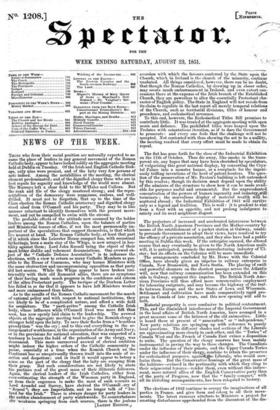NEWS OF THE WEEK.
TitOSE who from their social position are naturally expected to as- sume the place of leaders in any general movement of the Roman Catholic body, appear to have looked coldly on the aggregate meeting held at Dublin on Tuesday. Of the Irish and English Catholic Bish- opi, only nine were present, and of the laity very few persons of mite indeed. Among the notabilities at the meeting, the clerical element predominated; and of the dignified clergy those who are in best repute for sagacity and knowledge of the world were absent. The Murrays left a clear field to the M'Hales and Cullens. But the rank and file of the clergy mustered strong; and the repre- sentatives of the democracy were inniaerous; zealous, and well- drilled. It must not be forgotteni that up to the time of the Claae election the Roman Catholic aristocracy and dignified clergy stood aloof from O'Connell and his party. They may be in like manner reluctant to identify themselves with the present move- ment, and yet be compelled to swim with the stream. The probable effects of the attitude now assumed by the bolder leaders among the' Roman Catholics, upon.-the balance of parties anti Ministerial tenure of office, if not the most permanently im- portant of the speculations that suggest themselves, is that which lies nearest at hand. The Roman Catholic body, at-least that part of it which since the Leicester House compact has, with occasional bjckcrings, been a main stay of the Whigs, is now arrayed in hos- tility against them; Lord John Russell being the object of their most bitter dislike and vehement denunciations. One avowed ob- ject of the " Catholic Defence Association" is to, influence the elections, with a view to return as many Catholic Members as pos- sible to the Honse. of Commons, who may harass Ministers with the same obstructive and uncompromising opposition as that party did last session. While the Whigs appear to have broken irre- trievably with their old Romanist allies, there are no symptoms of their having made much progress in the confidence and esteem of the ultra-Protestant party. The tactigue of the Durham Letter has failed in so far that it appears to have left Ministers weaker and more embarrassed than before.
As to the results of the Roman Catholic movement for the march of national policy and with respect to national institutions, they are "likely to be of a complicated nature, and afford a wide field for :conjecture. The " parti-pretre" among the Catholic Irish_ body, whose influence while O'Connell lived was more felt than seen, has now openly laid claim to the leadership. The avowed objects at the aggregate meeting tend to give the Romish clergy a stronger hold upon the laity. To save their flocks from a " heartless proselytisin " was the cry ; and to this end everything in the ar- rangement of workhouses, in the organization of the Army and Navy, or in the pro-visions for national education, that was suspected of a tendency to loosen the hold of the priesthood or the clergy, was denounced. This more unreserved avowal of clerical ambition might induce the higher orders of the Catholic community to pow, especially at a time when the Romish Church on 'the Continent has so unequivocally thrown itself into the scale of re- action and despotism; and in itself it would appear to betray a sense on the part of the clergy that the laity are escaping from their grasp. But such considerations are not likely to abate the partisan zeal of the great mass of their illiterate followers. Again, the clerical leaders of the Irish Catholics, either from over-estimating the strength of the Wiseman party in England, or from their eagerness to make the most of such recruits as Lord_ Arundel and Surrey, have shelved the O'Connell . cry of "'Repeal "; they are Imperialists, and no longer talk of "Ire- land for the Irish." There is always danger for party leaders in 46 sadden abandonment of party watchwords. To counterbalance the- weakness springing from such sources, there is. the jealous aversion with which the favours conferred by the State upon the Church, which. in Ireland is the church of the minority, continue unabated. All things considered, however, there can be no doubt, that though the Roman Catholics, by drawing up in closer order, may create much embarrassment inireland; and even extort con- cessions there at the expense of the Irish branch of the Established Church, they are powerless to alter the essentially Protestantcha- racter of Reglish policy. The State in England will not recede from its claim to regulate in the last resort all merely temporal relations of the -Church, such as territorial divisions, titles of honour and precedence, and ecclesiastical revenues.
To this end, however, the Ecclesiastical Titles Bill promises to contribute little. It was treated at the aggregate meeting with open scorn and defiance. The prohibited titles were heaped upon the Prelates. with ostentatious iteration, as if to dare the Government to prosecute : and every one feels that the challenge will not be accepted. Not contented with thus showing the act to be a nullity, the meeting resolved that every effort must be made to obtain its repeal.


























